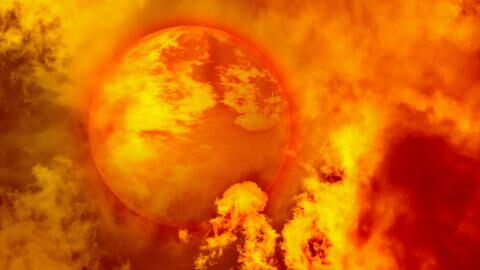Humans are teetering on the edge of self-destruction, warns a new report published in the Science Advances journal. There are nine key boundaries that we can check to track our health as a species on this planet. Crossing only one of them increases the chances of ruining the planet irreversibly.
Discover our latest podcast
So far, we have exceeded the safety limits of six and the remaining three are heading in a dangerous direction. According to the study, Earth is now ‘well outside of the safe operating space for humanity’.
The nine boundaries
The markers of our safety status are as follows: climate change, ozone depletion, ocean acidification, freshwater use, land-system change, biodiversity loss, nitrogen and phosphorus cycles, atmospheric aerosol loading and chemical pollution.
It’s not only that we have crossed the line with these boundaries, but that we are doing nothing to reverse most of the damage already caused. In fact, we continue to step further and further from the dividing line, increasing transgression levels and risking the future of humanity.
The scientists did point out that the limit for ozone depletion has reduced slightly, but it is still crossing the line. As for water, it went from barely safe to full-blown unsafe, notes Metro. This is reportedly due to river run-off and improvements in technology leading to a better understanding of the severity of the issue.
Stark warning that Earth is becoming 'unsafe for humanity' https://t.co/3fdidGq9xj
— Brian Padjen (@BrianPadjen1) September 14, 2023
Read more: Climate change could bring deadly diseases to the UK, experts warn
Earth is ‘in very bad shape’
The co-author of the study, Johan Rockstrom, said Earth is ‘losing resilience’ and described our planet as a patient that is ‘sick’. Rockstrom, who is the director of the Potsdam Institute for Climate Impact Research in Germany, developed these nine markers of Earth’s health and stability back in 2009.
He says that they ‘determine the fate of the planet’ and it’s not looking good. The markers are intertwined, so one getting worse often has a knock-on effect for another. It’s the old vicious cycle situation. However, if we could manage these factors, we might have a chance of turning things around. But how?
The solution
Computer simulations have offered a solution, and it seems strangely easy: we need to plant more trees. Forests act as natural sinks that store carbon dioxide instead of air, where it traps heat. This is why deforestation is such an important issue to tackle.
According to the World Resources Institute:
The world’s forests store approximately 861 gigatonnes of carbon… In total, this is equivalent to nearly a century’s worth of current annual fossil fuel emissions.
Read more:
⋙ Two asteroids will graze the Earth, here is all you need to know
⋙ Brits warned of 'sex-crazed' spiders invading their homes, here's where they may be hiding
Sources used:
Science Advances: Earth beyond six of nine planetary boundaries
Metro: Scientists’ stark warning: Earth is becoming ‘unsafe for humanity’
World Resources Institute: Forest Carbon Stocks















